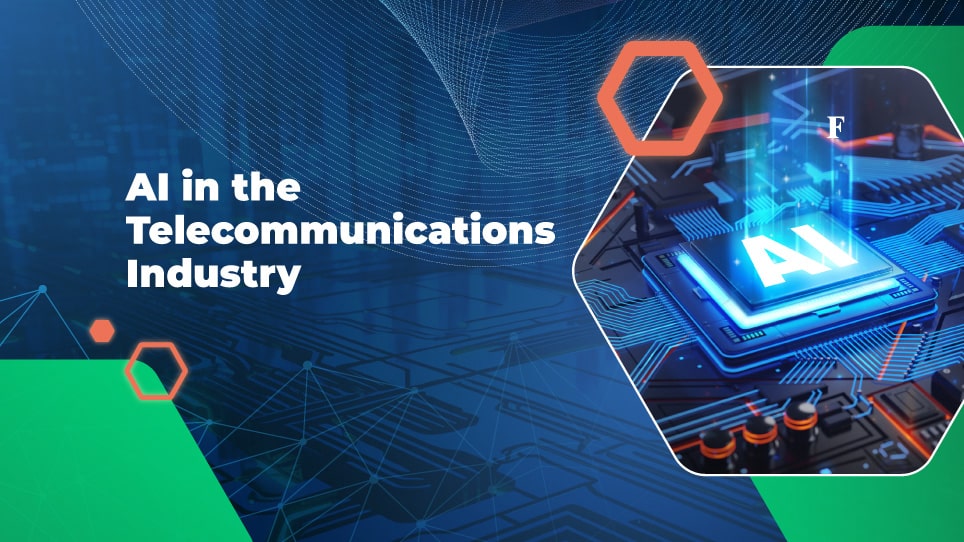
In today’s rapidly evolving digital landscape, one technology stands out as a driving force for transformation: Artificial Intelligence (AI). As AI capabilities continue to advance, its impact on various industries, including telecommunications, becomes increasingly profound.
From predictive analytics to personalized marketing strategies, AI offers numerous opportunities for enterprises to revolutionize their operations and customer interactions. In this blog, we explore the future of AI in telecommunications, examining its potential to enhance efficiency, drive innovation, and reshape the way businesses connect with their customers.
What is AI?

AI refers to systemized machines, particularly computer systems capable of performing complex tasks that historically humans could do, mimicking the way humans think and solve problems. AI involves teaching a machine to learn from its mistakes and experiences, much like how humans learn. Once the machine gathers enough knowledge or systems, it can make decisions independently, drawing from its learned insights.
In simple terms, AI helps machines act “smart” by understanding, thinking, and learning from what’s happening around them.
How is AI shaping the Telecommunication Industry

The adoption of AI has been widespread in the telecom industry, in which it has yielded significant results, with 73% of companies acknowledging that AI-driven network optimization services have generated a higher revenue. Moreover, due to AI, which is essential for staying competitive and meeting the needs of mobile operators and customers. While telecom services used to be mainly about calls and messages, they now rely on AI to offer better options, helping them stay ahead and ensure customer satisfaction.
A new report shows that the global AI in telecommunications market was worth a big $1.45 billion in 2022. Experts predict it will keep growing at a fast rate of 28.2% every year from 2023 to 2030. This means AI in telecom is set for a bright future. It’s becoming more and more important for telecom companies to use AI in their services, showing how essential it’s becoming in the industry.
Understanding AI terms in the Telecommunication industry
With AI experiencing a recent surge in popularity, there’s a growing need to understand what AI involves. Key terms to familiarize include:
1. Deep Learning
Deep Learning teaches computers to learn from lots of data, much like how people learn. It’s great at handling big amounts of information and finding complex patterns. In telecom, deep learning enhances communication experiences by utilizing smart algorithms to understand and improve interactions with technology. For instance, in video calls, deep learning helps make those video calls smoother and clearer by analyzing lots of data and figuring out how to make the video and sound better in real-time. It also powers speech recognition, enabling devices to accurately understand spoken words. Moreover, when browsing social media or watching videos online, deep learning algorithms personalize the experience by analyzing preferences and suggesting relevant content.
2. Machine Learning
Machine learning helps systems get better by learning from data. In the telecom industry, it predicts future network needs by looking at past data, helping manage resources better for smooth network operations. This benefits customers with better service, quicker problem-solving through automation, personalized recommendations, and enhanced security measures. Additionally, machine learning helps identify and prevent hacking attempts, keeping customers’ information safe from unauthorized access.

3. Natural Language Processing
Natural Language Processing (NLP) helps machines understand and generate text like humans do. In telecom, NLP is important for making Customer Service better with chatbots and virtual assistants. Similarly, at Forest Interactive, a telecom platform provider, using AI with an AI chatbot named Alice in their helpdesk makes online operations work better all the time. This helps the team do their jobs easier by making things simpler and automating some tasks.

The Future of AI
AI technology is expected to significantly impact the future of telecommunications. Its applications extend beyond revenue generation and ensuring customer satisfaction to include predictive analytics for network maintenance, real-time fraud detection, and personalized marketing strategies. As AI continues to grow, it is crucial for enterprises to implement AI into their workflow and towards their customers. By embracing AI, enterprises can streamline processes, boost efficiency, and cut costs. This not only enables them to remain competitive but also enhances customer experiences and fosters innovation within their industries.




